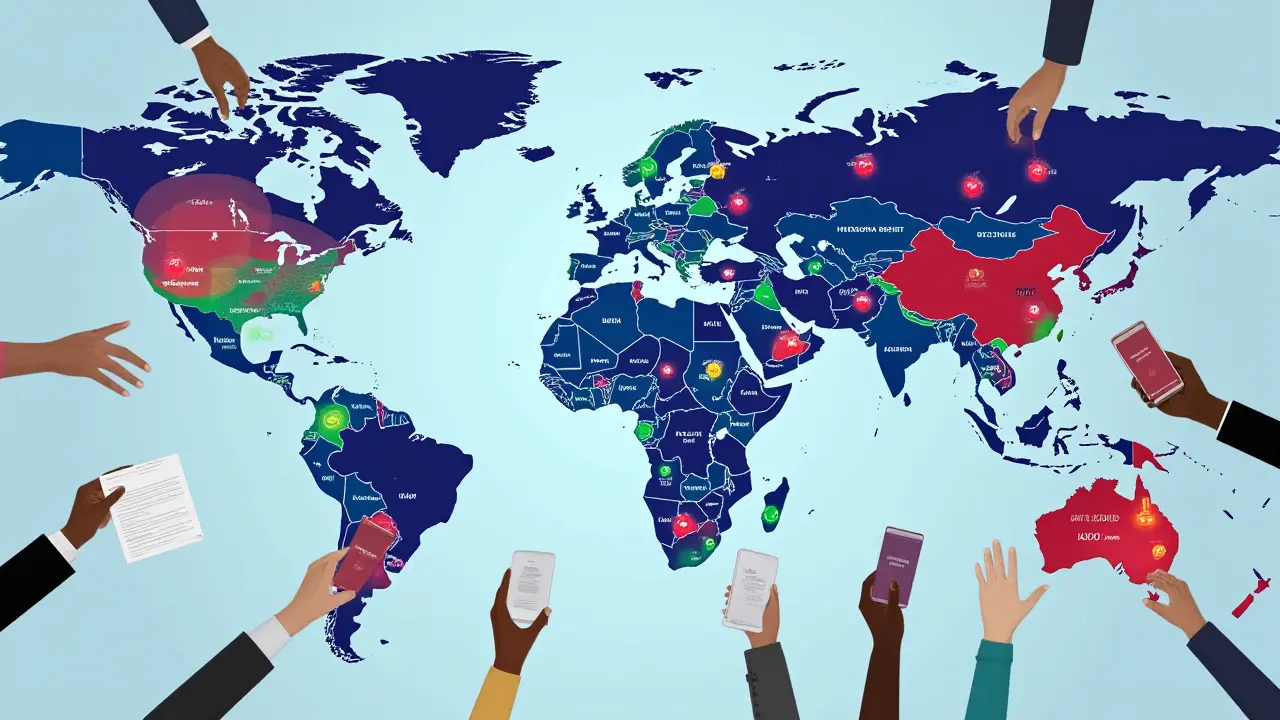Think escort sites are the same everywhere? Nope. There’s this wild mix of rules, loopholes, and gray zones that’s honestly more confusing than a cat in a bath. And as weird as it sounds, it all depends on where you are—and sometimes, what page you’re looking at. Some countries practically turn a blind eye, while others crack down harder than a dog chasing the mailman. Let’s break down what’s actually legal, what’s just tolerated, and where you want to be damn careful clicking ‘accept’.
How Laws Around Escort Sites Differ by Country
Let’s get one thing straight—escort sites aren’t either everywhere legal or illegal. The truth depends on how countries handle both online services and adult work. In places like the Netherlands and Germany, sex work is openly regulated, so escort sites operate under standard business rules. They register, pay taxes, and even require regular health check-ups. In the Netherlands as of 2025, authorities monitor over 200 escort-oriented businesses, and the government takes in millions yearly in taxes from the industry. If you’re using a site based in Amsterdam, you’ll usually find health regulations, age checks, and licensing blazed right across their landing pages.
But swing over to the United States and you get a patchwork quilt of laws. Some states like Nevada allow licensed prostitution in certain counties, so escort sites can advertise services there without issue. In most of the country, though, prostitution itself is illegal, making escort sites operate in a cloud of risk. While advertising for just ‘companionship’ is technically allowed in several states, crossing the line to offer explicit services can land both advertisers and clients in handcuffs. A famous 2018 case involved Backpage.com’s shutdown by the FBI after the site was accused of facilitating illegal transactions—not actual sex, but the mere suggestion was enough for authorities to pounce. There’s no federal law explicitly banning escort advertising—just laws against prostitution, pimping, or facilitating it, so most U.S. escort sites try to walk an imaginary tightrope just vague enough not to get knocked offline.
Flip the world over to Asia, and things get even more tangled. Japan technically outlaws ‘sexual intercourse’ for money, but leaves room for businesses that provide “compensated dating” or escort companionship without sex. That’s why you’ll often see Japanese sites with elaborate disclaimers separating the notion of a date from anything further. In Thailand, almost everyone knows about the tourism scene, yet prostitution itself is against the law. Still, countless online escort services operate in plain sight. Cops tend to focus more on trafficking or abuse than on adult consensual meets, creating what locals call “practical legal tolerance.”
The strictest countries? Head to the Middle East. In Saudi Arabia and most Gulf countries, all forms of prostitution—even advertising it—come with harsh penalties. Escort sites are outright banned, and even private ads can get you in deep trouble. Censorship firewalls block most major escort platforms, while authorities sometimes run fake sites to lure and catch offenders. Just last year, UAE authorities reported over 3,000 arrests from undercover stings tied to online ads. Anyone living or visiting there risks not just deportation, but real jail time.
There are also countries with so-called “Nordic model” laws—Sweden, Norway, and France—where selling sex is technically allowed, but buying it (or pitching it online) is illegal. Escort sites here often rebrand themselves as ‘dating’ or ‘social’ platforms, trying not to cross the invisible line that triggers police interest. Yet, in Sweden’s government review, even with laws focused on buyers, about 60% of escort site users said police rarely followed up unless trafficking was suspected. So while the digital ad landscape shifts, local enforcement does too. The patchiness is everywhere—some regions enforce the laws furiously, while others have them just for the books.

Oddball Loopholes and Common Pitfalls with Escort Sites
Now, let’s talk loopholes—because many escort sites survive on how well they tiptoe around the rules. You’ll spot them most in places like the UK, Canada, and Australia, where the ban is usually on ‘solicitation’ (directly offering sex for money), not on companionship or massage. So, the language gets hilariously coy: “services may include dinner, conversation, or travel companionship.” Nothing about sex—at least not in writing. Sites encourage users to call ahead, wink, or negotiate face-to-face. This legal dance is called “the gray zone,” and if you’re not tuned in, it’s easy to get scammed or accidentally break the law.
Tip from someone who’s seen too many sketchy ads: always check a site’s legal disclaimer. Real, legal escort platforms often require ID verification, sometimes even client screening, to stick to age and consent rules. They also list what services are actually on offer—massage only, companionship, or something more explicit—so you know what’s safe, what’s not. In the UK, big players like VivaStreet use strict age checks and data encryption to comply with 2021's Online Safety Bill. That means, theoretically, your info is safer and less likely to end up on some bulletin board (though no site is ever 100% safe from breaches, so use burners when possible).
Another thing: scams run wild where laws are muddy. Fake escort listings often use stolen photos or demand payment up front. In a 2023 UK survey, 15% of users got hit with scams, while 5% faced threats or blackmail. The lesson? Don’t send deposits. If a site offers shady payment methods or communication is only through encrypted messengers, step back—someone’s trying to dodge the law or worse, just take your cash.
Let’s not forget the other risks—privacy breaches and the risk of getting caught up in illegal activity unwittingly. If you’re traveling, laws change from airport to airport. Open that tab in Singapore or Dubai, and you could trigger criminal charges for possession of ‘obscene material,’ even if you found the site harmless elsewhere. Even in places like Germany or the Netherlands, you’re expected to check into registered sites—not some fly-by-night operation. If you’re making bookings or payments, check for HTTPS, business licenses, and legitimate reviews—much like you’d check before buying tickets to a concert.
Regular patrols monitor classified ads and review sites, often using undercover operations. Canada’s biggest sting in 2022—Operation Maverick—took down over 400 fake escort sites linked to trafficking. It’s a reminder: stick with regulated platforms if you value your freedom (and your money). And when police get involved, they rarely care if you “didn’t know the law”—prosecution stats in France, for example, show 70% of buyers cited ignorance, but only 10% got off with a warning. Laws aren’t always fair, but pleading “oops” doesn’t fly.
| Country | Escort Site Status | Legal Details | Risks |
|---|---|---|---|
| Netherlands | Legal and Regulated | Escort sites operate as businesses. | Mostly safe, but avoid unlicensed ads. |
| United States | Gray zone | Laws differ by state. | Legal risks, especially outside Nevada. |
| Japan | Loophole heavy | Companionship legal; sex is not. | Strict fines, possible arrest if line crossed. |
| Sweden | Illegal to buy | Selling isn’t prosecuted, buying is. | High-visibility police stings. |
| UAE | Strictly illegal | All escort ads banned; harsh penalties. | Jail and deportation risk. |
| Thailand | Technically illegal | Largely tolerated for tourists. | Occasional sweeps and bribes. |

How To Stay Informed and Safe in a Changing Legal World
If you think rules are carved in stone, you haven’t watched lawmakers try to keep up with tech. Escort sites have been around since the late ’90s, but every year, there are more digital crackdowns, raids, and hidden rules than anyone can keep up with. Just this spring, Australia saw Parliament expand the Online Safety Act, making websites responsible for rapid takedowns of any ‘explicit service’ ads linked to underage or coerced providers. Big platforms respond by moderating listings even harder and sometimes, just blocking traffic from entire countries if risk gets too high.
Here’s a tip: never trust that because a site shows up high in Google, it’s legal in your area. Even legal sites geo-block or change what they show based on your IP address. If you’re unsure if a service is legal, look it up in real time—laws change fast. The best sources? Government websites and non-profit advocacy groups, not forums or the sites themselves (they’re often playing both sides to stay afloat). I’ve seen Willow the cat walk with more dignity than some of the FAQ pages out there, especially if a site is trying to give the “we’re just a social network” defense.
If you’re traveling or looking to use a site in a new country, use a VPN just to browse, but never to transact or post unless you’re crystal clear on the rules. Some countries go after users, others the site owners, and some, like Russia, have gone after both—seizing servers, freezing accounts, and detaining anyone linked to the business. You don’t want your name in a database next to a server seize order.
The safest way to spot legit sites: look for transparency. Real legal services usually show clear owner info, privacy policies, and have some form of government or business registration number. They’re also picky about who signs up—not just anyone with a burner email. No privacy policy? No verified user system? That’s a red flag.
Staying safe isn’t just about not breaking the law—it’s about protecting your own privacy and avoiding scams. Use payment methods that don’t tie back to your real-world accounts whenever possible. Read legal disclaimers, and double-check the site’s country of registration—it matters. If you see the term escort sites paired with words like ‘anonymous,’ ‘untraceable,’ or ‘100% legal worldwide,’ it’s probably bloated hype.
And if you want to dig into numbers, here’s a recent fun fact: Statista reported that, as of May 2025, over 60% of all traffic to escort directories came from users outside the platform’s home country. People are always hunting for loopholes, safer ground, or just flying under the radar. But legal changes can break a once trusted site overnight.
- Stick with local legal info—laws change fast.
- Watch for sites using ultra-vague ads or no ID checks. It usually means more risk.
- Don’t send upfront payments or use weird payment methods.
- Always use protected networks. Skip public Wi-Fi or shared computers.
- Talk to people in your local scene for tips—online reviews help, but local news is gold.
It’s a wild, unpredictable landscape—one click can mean anything from a fun night out to a knock on your door. Just remember, what’s easy in Berlin could get you a lifetime ban in Dubai. The game keeps changing—so if you’re going to play, play smart.







